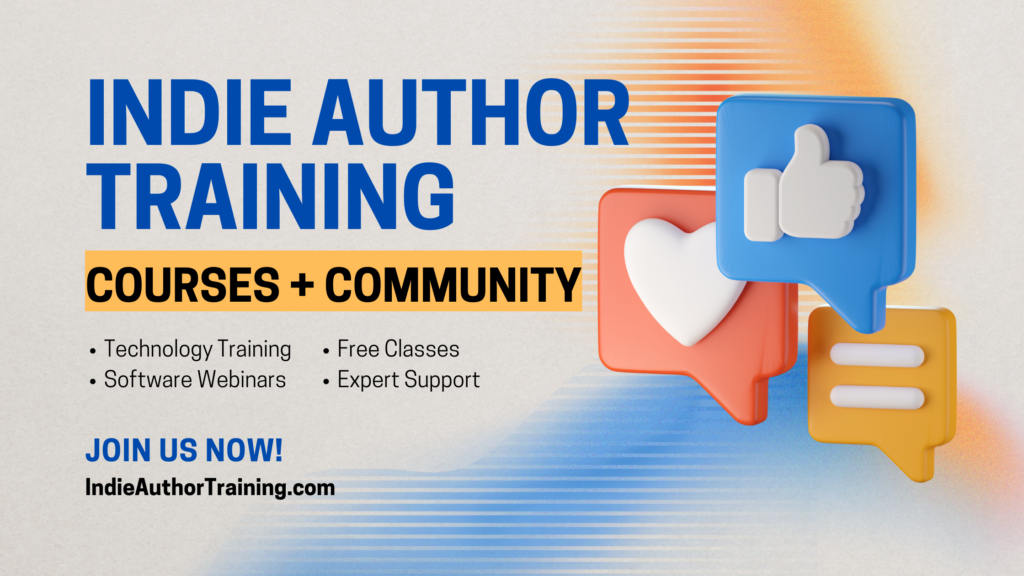Facebook can be a great place for authors to meet and get to know other authors and readers. It’s easy to post and to add a variety of information to your posts, including emoticons, photos, and videos, how you’re feeling and what you’re doing, check-ins, and more to give people an idea of who you are and what you’re interested in.
But of course, what we all want to know is how can we sell our books with our Facebook page? The thing is, apart from paid ads, using Facebook is a bit like going to a series of networking events. You wouldn’t (hopefully!) walk into a networking event and immediately start saying, “Buy my stuff, buy my stuff,” and it’s the same on Facebook too. It really is about being social and building relationships.
So how can you sell your books the right way on your Facebook page?
1. Author Page or Series Page?
First, you have a decision to make.
You can set up a page for every book and every series you’re going to write, but that’s a lot of work. It’s easier to simply set up a page for you as an author and share all your books and series under that pen name from there. Though, of course, it is up to you.
The main exception to just having an author page is if you ever write something like Harry Potter or Twilight that’s a complete phenomenon. If that happens, you’re probably going to need a series page so fans who know the books but don’t necessarily know your author name can still get their fix of series news, latest releases, and so on.
2. Fill in All the Things
Fill in as much info as you can everywhere Facebook will let you. Use your bio and your About section to give people a sense of who you are, what they can expect, and what genre(s) you write in. Use keywords so people can search for you, such as thriller writer or sweet romance author.
Add your other social links and include a link to your author website. Here, you could link to the main home page, you could send people to a landing page to sign up to your newsletter, or you could even send them straight to your Amazon author page.
You can also connect your page to Instagram, share posts on both platforms, and create Instagram ads. To do this, click the Manage button to go to your professional dashboard and choose Linked Accounts. From your dashboard, you can also click on Podcasts and link to your podcast if you have one.
The more information you provide, the easier it is for fans to find you and find your books.
Pro tip: Preview your page as a reader would see it. Click on the three dots on the right of your page and click View As to make sure it looks how you want it to look.
3. What to Post
There’s no need to struggle for something to post. Here are just some ideas that can keep you going:
Share blog posts from your website, share other authors’ blog posts, do a cover reveal, share unedited snippets from your latest WIP, and give sneak peeks and teasers from your upcoming release. You can talk about your writing process, share funny typos and autocorrects, talk about your pets, share a photo of your writing space, or ask readers to name a character or a place in your next book. You can look for ARC readers, share your other social links, talk about books you’re reading, ask questions about readers’ favorite books and characters, and talk about what gave you the idea for your book. You can share any events you’re doing, like author signings; do a short live reading of part of your next book; and talk about what you do outside of writing.
Pro tip: Make it easy on yourself and use relevant hashtags so readers can easily find you. Use your genre hashtags, your book title, and series title. Also try more general hashtags, like #amwriting, #WriterWednesday, and #SampleSunday.
4. Be Authentic
In addition to the mega list above, always, always be yourself. It’s much less work than trying to be someone you’re not, and readers can tell if you aren’t being true to yourself. Genuine passion and enthusiasm are appealing, engaging, and contagious, and people will connect with you far more easily if you really mean what you’re saying.
5. Be Consistent
The worst thing you can do on Facebook is to post all day every day for a few weeks and then stop. If tumbleweeds have taken over your Facebook page and you need to sweep off the cobwebs before you can even see where to click to make a new post, that doesn’t give readers the best impression, especially ones who are new to you. Try to post at least a couple of times a week, preferably a couple of times a day so that they always have something new to see and to engage with. Empty pages don’t sell books, but genuine, personable, and relevant consistent posts build relationships that can lead to book sales over time.
6. Build Relationships with Readers
As we mentioned earlier, don’t be one of those whose entire Facebook page consists of “here’s my new book” or “buy my book.” Get to know your readers and let them get to know you. Raving superfans aren’t born from a string of ads; they’re born from genuine exchanges of views and being able to relate to each other. Also, Facebook loves engagement and replying to your readers’ comments isn’t only lovely for them, but Facebook will love you too and reward you with increased visibility. We know we don’t have to spell it out, but here it is: More visibility means readers can more easily find you and your books.
7. Build Relationships with Other Authors
Other authors aren’t your competition. Billions of readers are out there—more than enough for everyone. Share other authors’ new releases on your page, talk about books you really enjoyed, and tag their authors. Being generous does come back to you. You’ll find most authors are thrilled to get a shout-out on your page, and many will return the favor when you have a new release. Many other authors also have a group where they’ll let you post about your new releases or even do a takeover to introduce you to their readers. You might also find yourself perfectly placed to join an anthology another author is putting together or to take part in a cross-promotion event they’re running, which will also expose you to new audiences. Even better, you’ll make some fantastic friends and learn a whole lot, which is priceless. As with any kind of networking, give first without expectations, be genuine, and reap the rewards.
8. Images and Branding
Imagine a shop front with a tatty, faded sign, dirty windows, and handwritten notices advertising the goods inside. Now picture a different store with gleaming windows, inviting window displays, and a fresh, consistent look inside and outside. You know which one you’re shopping at and so do your readers. Keep all your social media pages, not just Facebook, consistent with your author brand. Use the same fonts, colors, and look everywhere you post and create branded images using Canva, BookBrush, or similar so readers can instantly recognize one of your posts over any other authors’ posts.
You’ll stand out if you do it right and—you guessed it—so will your books.
9. Regularly Check Your Page
With any type of marketing, you will need to step back and look at what you’ve got every now and again. Perhaps do it when you set your goals for the next year or make a plan to check your Facebook page once a quarter to see if it’s still aiming for and reaching the right audience and that your author branding looks as it should. If not, tidy it up, refresh it, and get it back on track.
10. Facebook Ads
We couldn’t mention Facebook and not mention how successful Facebook ads can be for book promotion. You need your Facebook page in order to run Facebook Ads, so it’s worth setting it up for that alone. Check out Mark Dawson’s Ads for Authors course when it opens or Bryan Cohen’s free 5-Day Author Ad Profit Challenge to learn how to make the most of Facebook Ads for selling your books.






